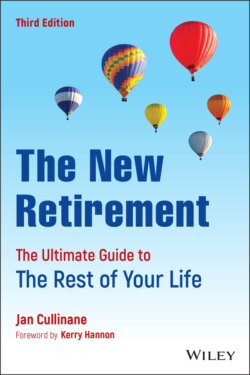Читать книгу The New Retirement - Jan Cullinane - Страница 36
CHAPTER 2 168 Hours a Week
ОглавлениеDoes the idea of planning 168 hours a week for two or three decades (or more) sound thrilling or intimidating? If you deduct eight hours in a 24-hour period for sleeping (and I'm guessing not too many of us get a full eight hours of sleep every night), that still leaves 112 hours a week to “fill” mindfully or mindlessly. It was noted in Chapter 1 that it's important to replace the benefits, in addition to a paycheck, that working provides. That is what this chapter is about. Retirement doesn't mean sitting on the sidelines of life. It's the freedom to choose and forge new paths, pursuits, relationships, and opportunities. You can decide who you are and who you want to be. You can re-invent yourself. Kind of like our GPS, when we need to “recalculate.”
Assuming you have the financial means, you can play golf, pickleball, tennis, watch television, and eat all your meals out, but what other options exist? What types of volunteer and lifelong learning opportunities are there? Hobbies? Travel? Play a new sport? Volunteer? Learn a new language? Use the time to deepen relationships with family/friends? Decide to finally lose those 20 or 30 extra pounds you've been carrying around for several decades? Create or do something that will make a lasting impact, long after your death (see Chapter 10)? Start a second (or third or fourth) career (see Chapter 3)?
But, is there a “sweet spot” for how much unscheduled time per day is best? You may have spent or you are spending much of your preretirement life with so many demands on your time, you feel you can barely make a trip to the bathroom. Retirement can change that time crush, but many retired people continue to over-schedule and still feel under constant time pressure. A 2021 study addressed this exact question about time – it turns out people are generally happiest with about two to five hours of unstructured time per day. Fewer than two hours created stress, while more than five hours each day of free time negatively affected feelings of well-being and feeling purposeful. So, just as in the story of Goldilocks (as in many facets of life), there is a balance that is often “just right.” And, what's the best thing to do with that “free time”? The researchers found exercising (I know, for some it's more of a job/obsession), learning new things, or spending time with others increased happiness – in other words, doing things by choice, not obligation. And, the free time doesn't have to be done in large chunks of time to have a beneficial effect. Reading a short chapter of a book or taking a mile hike or just watching the clouds passing overhead for 15 minutes can all be good uses of discretionary time. A reminder – what's considered “free time” for some (walking the dog) could be considered obligatory by others.
Now is a good time to complete the “Time on Your Hands” worksheet at the end of this chapter to get a preliminary sense of how you think you will/do spend your time. The results may be eye-opening. If part of a couple, compare and discuss your results.
